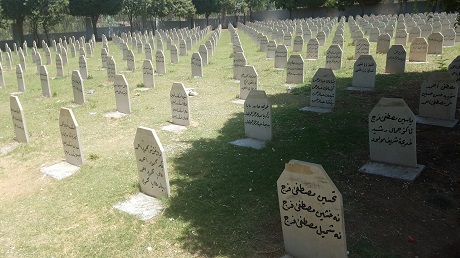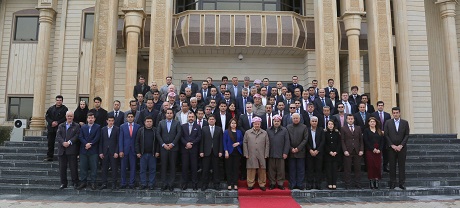HALABJA, Kurdistan Region — Officials expressed condolences and support for Halabja 31 years after the deposed Baath regime used planes to drop toxic gasses on the Kurdish city, killing 5,000 people instantly and displacing tens of thousands.
In commemoration of this disaster, the Kurdistan Regional Government (KRG) reiterated "its seriousness in serving the injured, caring for the lives of the families and relatives of the victims of the chemical attack, and delivering more services to Halabja.”
“The government considers it an important and main duty to deliver better services to the province of Halabja and its honorable people,” a KRG statement added.
Around 5,000 Kurds died and more than 10,000 were wounded when Saddam Hussein’s regime bombed the city of Halabja with chemical weapons on March 16, 1988, during the Iran-Iraq war.
“We expect the Iraqi government to live up to its legal and moral duties toward this province and its people, to care for them and provide for material and immaterial compensation to its environment and people as victims of the country of Iraq,” read the statement.
Halabja is a “symbol of pain and sacrifice of our nation as well as a symbol of our endurance and being alive.”
The province is the southeast of the Kurdistan Region along the border with Iran.
“We will forever remember the victims and loved ones we lost in this heartbreaking disaster,” the statement said.

A portion of a cemetery in Halabja lists the name of each family member killed during the Halabja massacre. File photo: Rudaw English
Iraqi Prime Minister Adil Abdul-Mahdi wrote his thoughts on Facebook on the anniversary of the tragedy.
“Today we remember the tragedy of Halabja where our memories remember an unforgettable pain and the deep wounds left by the brutality of the dictatorship which ordered to attack the innocent [people] with toxic chemical gases in a genocide which stunned all humanity and shook the conscience of the world," said the PM.
Abdul-Mahdi described the attack as yet another "genocide" committed against Iraqis.
“It was another black day on the history of Saddam’s Baathist crimes against our Kurdish people who, like the rest of Iraqis faced crimes of death, destruction, and genocide," he wrote.
“Halabja was and will remain a symbol of sacrifice and witness to the ugliness of dictatorship.”
Today, we commemorate the barbaric chemical attacks on civilians in Halabja by Saddam Hussein’s brutal regime in 1988. Let this day be a reminder to prevent future genocidal attacks on our citizens, and civilians everywhere, in the name of racist, religious or political ideology.
— Nechirvan Barzani (@PMBarzani) March 16, 2019
KRG Prime Minister Nechirvan Barzani called on Twitter for the day to be "a reminder to prevent future genocidal attacks on our citizens, and civilians everywhere, in the name of racist, religious or political ideology."
Iraqi President Barham Salih, a Kurd from neighboring Sulaimani, underscored that Halabja provided proof of the Baath regime's atrocities.
"Halabja proves the suffering of the people of Kurdistan and Iraq from a tyrant regime that eliminated thousands of people through bombarding innocent people with prohibited chemical weapons," he tweeted.

Masoud Barzani and presidential staff pose for a photo in Erbil, Kurdistan Region, on March 16, 2019, in remembrance of the Halabja genocide. Photo: Masoud Barzani office
The Kurdistan Democratic Party's Masoud Barzani, the head of the largest party in the Kurdistan Region, called for the international community to compensate victims of the genocide.
"The international community shall take concrete action to introduce this brutal crime as genocide and compensate the victims as well as reconstruction [of Halabja] in a way that meets with the level of sacrifices and dignified history of this city."
Qubad Talabani, a prominent Patriotic Union of Kurdistan (PUK) politician who led the party two second-place in last year's parliamentary election, said in remembrance of the chemical attack on Halabja, they are working to make more of Halabja’s border crossings official.
“Through delivering services, reconstruction and good governance, we can turn this gassed and ruined city into a success story and an example,” Talabani stated on Facebook.
The US Consulate General in Erbil posted a “somber” message on the anniversary of the “chemical weapons attack.”
“In remembrance of this somber anniversary, the US Consulate General Erbil held a moment of silence. The US Mission joins the rest of the world in remembering the suffering of the people of Halabja,” read a Facebook statement from the Americans.
Alongside several graphic photographs of Halabja’s victims, Iran’s Foreign Minister Javad Zarif tweeted his own tribute for the anniversary – simultaneously attacking the West’s response to the massacre and embracing the Kurds as “brethren”.
“First they denied it happened—then they blamed Iran. When it was clear it was their own ally, using their own chemical weapons, they were silent. The West may like to forget about horrors of Halabja & Sardasht—31 years ago today—but neither we, nor our Kurdish brethren, ever will,” Zarif tweeted.
Turkish President Recep Tayyip Erdogan tweeted on Saturday evening: “Thirty-one years ago, due to chemical bombardment, thousands of civil people lost their lives and to this day this wound still lingers in our conscience. The chemical bombing of Halabja is a dark spot on the history of humanity. I pray for blessings from God for Kurdish brothers who died in the Halabja massacre.”
"Thirty-one years ago, Turkey opened its doors to those Kurdish brothers who fled the attack and supported them. Today, we as Turkey - a friend and neighbor - deeply feel the great pain caused by this massacre which does not go with the dignity of humanity,” stated Turkey’s Consulate General in Erbil.
It said that Turkey is working on "providing a peaceful living culture in the region and the world in order to prevent such tragedies."
The procedures for the issuance of the plates will begin after Newroz holidays.
Those affected by the toxic gasses continue to suffer their lingering effects.
Events and ceremonies are planned throughout Kurdistan to remember one of the Kurdish peoples' darkest days.
RELATED: A guarded secret that finally brought a missing child of Halabja home
Update: 11:57 p.m.



Comments
Rudaw moderates all comments submitted on our website. We welcome comments which are relevant to the article and encourage further discussion about the issues that matter to you. We also welcome constructive criticism about Rudaw.
To be approved for publication, however, your comments must meet our community guidelines.
We will not tolerate the following: profanity, threats, personal attacks, vulgarity, abuse (such as sexism, racism, homophobia or xenophobia), or commercial or personal promotion.
Comments that do not meet our guidelines will be rejected. Comments are not edited – they are either approved or rejected.
Post a comment